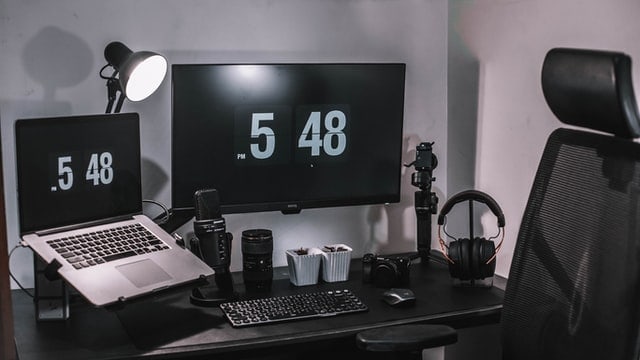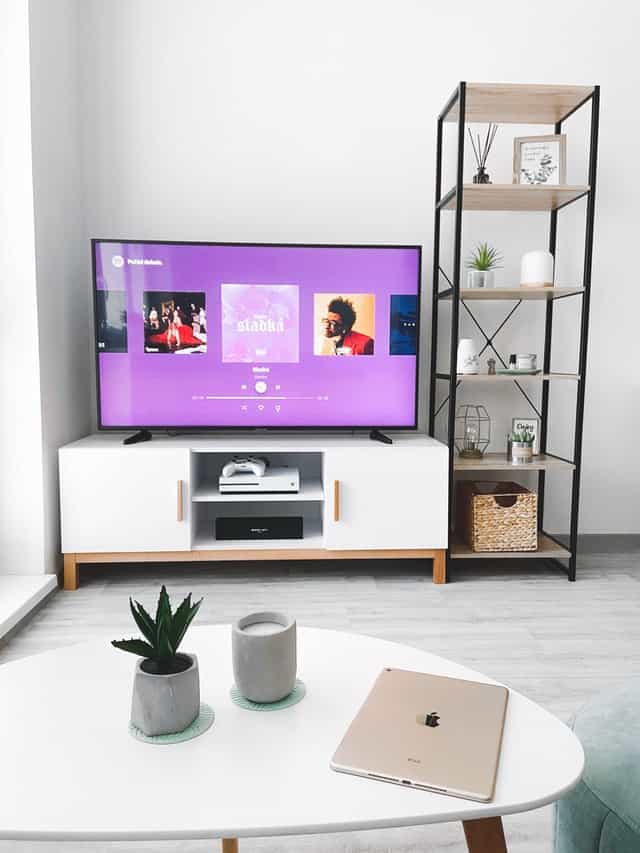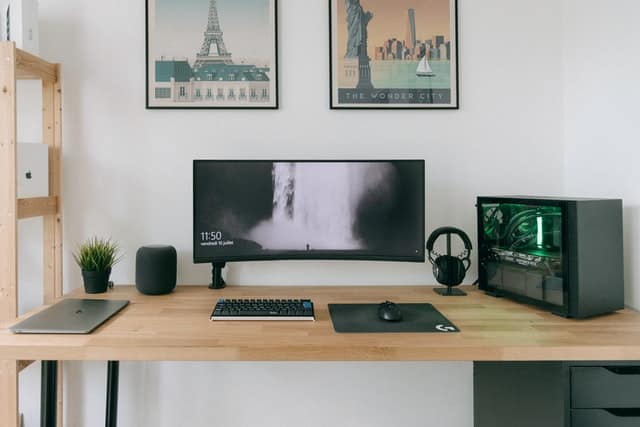Home offices are certainly one of the popular topics this year, primarily due to the ongoing pandemic.
After spending more than a year in this pandemic, most of us might have set up a home office by now.
If you have a home office, you must have thought wisely about adding to it and what not to.
You might have asked yourself in this discussion: Shall I keep a TV in my home office? Is it a sensible choice? What are the pros and cons?
A TV can be a great addition to your home office. It will provide you with information on global issues and help you get some entertainment during breaks. You can even use it during your meetings as the big screen provides the feeling of face-to-face conversation with your clients.

A TV in your home office is a debatable topic for a few people. Some may think it will be a mere distraction at work.
However, I prefer a TV in my home office. If you think about it, the phone in your hands is a far greater distraction than a TV.
So, it all comes down to how you make use of it.
If you are in a dilemma and trying to learn more on this topic before committing to it, this article will answer your questions.
Table of Contents Show
Benefits of Setting Up a TV in your Home Office
Before we learn more, you should remember that you don’t have to spend a lot of cash on this TV.
Choosing one within your budget is equally sufficient, considering that this is not the main TV in your household.
It might be surprising, but there are more benefits than disadvantages.
So, here are some essential advantages of a TV in your home office.
1. Auxiliary Display
The TV can be utilized as a secondary display while working.
If you work with spreadsheets or documents with tiny letters, your eyes will sprain due to constant squinting.
As a solution, you can cast your computer to your TV instead of hunching your back when you use your laptop.

Sometimes you may need to open many apps at once. A lot going on in one computer can crash your device and gradually slow down the system.
So, an auxiliary display such as a TV will help you stay organized.
Also, computers and laptops may shut off after a while, and their sleep options can disrupt your workflow.
2. Helpful Tool for Meetings
Meetings are a crucial part of any project or organization. It helps in team building as well as sharing opinions.
Using a TV for meetings can help you see all your coworkers on a big screen without moving between smaller tabs.
In addition, it stimulates the feeling of one-to-one communication.

Moreover, you won’t need to switch from documents to your zoom calls and vice versa. When you constantly shift from one tab to another, there is a greater chance of messing up.
Perhaps you may not even realize that you accidentally disconnected the call while trying to read out your presentation.
Hence, a TV can allow you to fully concentrate on your work, especially during conferences and meetings.
3. Great for Home-Based Learning
If you connect to cable TV, it guarantees that you will learn about the latest news updates.
Tuning in to the news can benefit individuals whose jobs rely significantly on knowing current events, product launches, and the daily stock market.
Giving attention to detailed news, analysis of businesses, and many more will further broaden your horizon of knowledge.
In an age where everything on the internet is not particularly accurate, using a TV can work in your favor to learn about mergers and acquisitions, court judgments, business deals, growing companies, and even funds.
4. Provides Background Noise
To be most productive, many individuals require background noise or music. This is why cafés and restaurants have been hotspots for students and office workers.
However, you may not have this choice due to the ongoing situation. You can improve your working space with a TV by playing some good music.
Of course, the sound must be kept at a non-intrusive volume, so you don’t over-stimulate your brain.
A motivating quote on your TV screen can brighten your day on a hectic day. And soft background noise in a quiet office will make you feel at ease.

You can even put up a video of a fireplace or a beach on your TV. All these videos are readily available on Youtube and various websites like LifeAt.
5. Provides Entertainment
Breaks are essential for working long hours in our home office. A short break every few hours will allow you to stay refreshed and active.
A TV can transform your home office. You can take quality breaks by watching a movie or playing games. This way, you won’t need to go to a different place to take a break.
However, for this to work, you should have excellent self-discipline.

If you spend most of your time in your home office, you can sometimes spend time with your kids as you play video games with them on this TV.
Is Setting Up a TV in Home Office a Major Distraction?
Everyone has their own unique needs when it comes to productivity and time management.
For example, some people may need background sounds to stay focused, while others may like a silent place.
Few people may also like both environments interchangeably.
For example, You will like peaceful and quiet surroundings when you try to read from numerous data in a limited time.
But, you may want to put on music when your work is not urgent, or the job is relatively easy.
So, setting up a TV can work for some while distracting others. However, if you wish to keep a TV in your home office, you need to practice a great deal of self-control.
These are a couple of disadvantages of a TV in a home office.
- If you use a TV with lower-quality visuals, it might not be logical to keep it too close to your eyes.
- Without fast internet, video calls on a TV can be slow and laggy.
- You might not even realize time is flying by as you indulge in your favorite TV series.
- In a trance, you may start writing whatever you hear playing on your TV.
- Since you can take your breaks watching TV, you might sit in one place for long hours, which is unsuitable for your health.
Related Article: Should you watch TV while Working from Home?
Where Should a TV be Placed in a Home Office?
Let’s start with the placement of your desk. To add a TV, place your workstation in the middle of the room, leaving enough space between you and the wall.
You want to mount the TV so you can comfortably view it over your computer.
It would be best if the window is to your left or right, as this will provide ambient lighting.

Learn more on: Should your Desk Face the Wall?
You may securely select where you’ll install your TV after setting up your workstation.
1. In Front of your Computer
If you use your TV as a secondary display, you should place it in front of your desk or computer.
That way, you will be able to view it without much difficulty.
You can either mount it on the wall in front of you or place it on your desk behind your main computer.
Be mindful that you want to put it further away from you with a big TV so you don’t strain your eyes. With smaller models, you can set it up on your desk.

2. On an Adjacent Wall
You should mount your TV towards the left or right of your computer if you are using the TV as background noise. Now, the TV will be less of a distraction.
You can then add a sofa or a comfortable chair opposite your TV. This way, when you take breaks, you can sit on your comfy couch and watch your favorite shows.
To mount a TV at the perfect height, measure the distance from the floor to your eyes while sitting down.
Now, you want to mount the TV for a viewing angle of less than 30 degrees from this height.
It will be easier to stay focused since the TV is not suitable in front of you. Moreover, the sofa will be your designated area to rest and not on your desk.
Related Article: Can you mount computer monitor to the wall?
3. Cabinet for your TV
If you use your TV for various purposes, the best solution might incorporate a cabinet with doors.
A TV in a built-in cabinet or shelf with doors will provide a sophisticated look to your home office and prevent interference.
With this option, you can now close off the view during focused work sessions. Then, when you relax, you can open the doors to use your TV.
Not only will this build a habit of self-discipline, but it also adds one more step to turning on your TV. The more work you need to turn on the TV, the fewer times you will use it to procrastinate.
Here are some links from amazon for a TV wall mount, TV stand, and HDMI cables for a TV.
More Tips on Finding the Perfect Place for your TV
- You might want to position a home office in the bedroom in front of your bed. This allows you to see the TV as you work from your comfy bed.
- If you work in the kitchen, your TV should be placed in an area directly visible from your work desk. You might want to consider a place that allows you to watch shows, see recipes on your TV after work.
- Similarly, in a dining room, the TV should be placed at the location, making it applicable during work hours and for guests or family members.
Adding TV as a Second Monitor for your Home Office
TVs are best suited as a second monitor rather than the main one. This is due to the big size and other cons, such as screen resolution and input lag.
Advantages of Setting up Tv as a Second Screen
Below, let us learn about the advantages of using a TV as a second monitor.
1. Audio Settings
If you use a monitor, you will have to purchase separate speakers for it. However, a TV comes with built-in speakers.
The sound quality may not give you the surround sound experience, but it is good enough for office work.
Unfortunately, speakers can also be expensive and take up a lot of space.
Moreover, TVs include various ports compared to standard monitors, including USB, VGA, and HDMI.

2. Cost-Effective Solution
A 4K Tv will be much less pricey for a second monitor than a monitor of the same size.
Even just a few years ago, televisions and computers had similar pricing, but TVs haven’t been in much demand in recent years. Hence, a TV is much cheaper.
Another reason is that monitors are used for extensive work and have more features making them costly. This is why a monitor is more appropriate as the main display.
The TV in your office will most likely display data or Entertainment and not run apps like video editing, animation, etc. So, it is a cost-efficient solution.
3. More Convenient
You can quickly transfer it to other consoles, cable boxes, and streaming devices when you’re done using it as a display.
That means you may have an all-in-one setup in your home office for your gaming, Entertainment, work, news, and media needs.
This might be a great way to save room for people with limited space in their workstations.

Setting up a TV is also far more straightforward than a monitor.
Furthermore, most monitors don’t have the feature of a wireless connection. So, you might need to spend more money on all the ports and wires.
Disadvantages of Setting up TV as a Second Screen
Some drawbacks of using a TV as a second monitor are given below.
1. Input Lag
A TV will be a bit slow compared to monitors with higher pixel densities. You will notice it even more if you switch from a monitor to a TV.
If you use your TV only to view things, you might be able to adjust to it. However, you might face difficulties if you connect your mouse or keyboard to the TV.
Assuming that you want your work to be quick and hassle-free, a TV may not be the right choice. The lag may be even longer if you use high-end software or for gaming.
2. Expensive Options
Expensive TVs usually have better connectivity and picture frame. So, if you invest in a cheaper model, you will notice the big pixels when working close to the TV.
You are in big trouble if your TV doesn’t have ports for connection.
Even on expensive models, you should check all the ports and compatibility according to your needs.
Again, the excess fuzziness can cause eye strain if you work close to your TV.
You might regret using a TV if your work uses complicated software and equipment.

3. Optimization Difficulties
TVs are made for watching movies and shows, so they have a relatively brighter display. Moreover, optimizing the settings in them is not very easy.
You may need to dig deep into every crevice you see to find the setting of your choice.
Moreover, TVs can get very slow over time, further hindering your work.
The brighter light and contrast ratios can harm your eyes if you work close to the TV.
This is because the optimizations in TV are far less than in a monitor.
How to Choose the Best TV for your Home Office?
You should list the characteristics you require in your TV before purchasing it for your Home Office.
- Display Type of TV
- Screen Size
- Screen Resolution
- Refresh Rate
- Connectivity Options
- Sound
- Budget
Here are some tips to help you choose a Tv for your Home Office.
- The amount of pixels necessary to create a picture on a screen is referred to as resolution. A greater resolution yields a clearer image with more details. Thus a higher resolution is preferable. If you work close to the TV, choose one with better resolution and vice-versa.
- The standard refresh rate is set to 60 times per second. A 60 Hz refresh rate, on the other hand, might cause fuzzy images in situations with fast-moving objects, especially on LCD HDTVs. Get a TV with a higher refresh rate for working on complicated software.
- When evaluating your TV’s audio quality, consider that the higher the wattage, the louder the sound output.
- If you choose a 4K Ultra HD TV, ensure the TV’s ports also support HDMI 2.0 for future Ultra HD inputs.
- After looking through the price, look into purchasing an extended warranty.
- Dive deep into LED, QLED, and OLED TV recommendations.
When choosing TVs, the most reputed brands like Sony, LG, and Samsung come to our attention.
However, it is better to choose from a well-known Company as you will learn about all its features in detail on any platform. In addition, you will also get the guaranteed potential of the TV.
Sony KD-43X80J, LG C1 OLED, Samsung UE43TU7100, and LG CX 48″ are some recommendations that provide amazing visuals and are on the cheaper side.
Also, this video might be helpful for you.
Final Verdict
TV is an excellent source of knowledge and Entertainment for your home office.
It will benefit you as well as other family members. It also creates a polished style in your workspace.
Suppose you have invited some guests or clients. You can turn your home office into a guest room.
Your kids may use the TV for online classes when you don’t use the TV. There are a handful of ideas!
Now that the pros and cons of TV for your home office are cleared, give some thought to the above details before you commit to investing in one.
There are many options, from brands to prices for a TV.
It would be beneficial if you spent some time reviewing all the choices within your budget. Also, look at the picture quality and warranty labels. Then, you are good to go!


